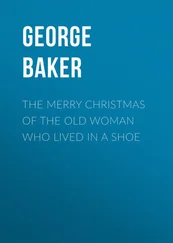Amanda Douglas - The Old Woman Who Lived in a Shoe - or, There's No Place Like Home
Здесь есть возможность читать онлайн «Amanda Douglas - The Old Woman Who Lived in a Shoe - or, There's No Place Like Home» — ознакомительный отрывок электронной книги совершенно бесплатно, а после прочтения отрывка купить полную версию. В некоторых случаях можно слушать аудио, скачать через торрент в формате fb2 и присутствует краткое содержание. ISBN: , Издательство: Иностранный паблик, Жанр: foreign_prose, foreign_children, на английском языке. Описание произведения, (предисловие) а так же отзывы посетителей доступны на портале библиотеки ЛибКат.
- Название:The Old Woman Who Lived in a Shoe: or, There's No Place Like Home
- Автор:
- Издательство:Иностранный паблик
- Жанр:
- Год:неизвестен
- ISBN:http://www.gutenberg.org/ebooks/43659
- Рейтинг книги:5 / 5. Голосов: 1
-
Избранное:Добавить в избранное
- Отзывы:
-
Ваша оценка:
- 100
- 1
- 2
- 3
- 4
- 5
The Old Woman Who Lived in a Shoe: or, There's No Place Like Home: краткое содержание, описание и аннотация
Предлагаем к чтению аннотацию, описание, краткое содержание или предисловие (зависит от того, что написал сам автор книги «The Old Woman Who Lived in a Shoe: or, There's No Place Like Home»). Если вы не нашли необходимую информацию о книге — напишите в комментариях, мы постараемся отыскать её.
The Old Woman Who Lived in a Shoe: or, There's No Place Like Home — читать онлайн ознакомительный отрывок
Ниже представлен текст книги, разбитый по страницам. Система сохранения места последней прочитанной страницы, позволяет с удобством читать онлайн бесплатно книгу «The Old Woman Who Lived in a Shoe: or, There's No Place Like Home», без необходимости каждый раз заново искать на чём Вы остановились. Поставьте закладку, и сможете в любой момент перейти на страницу, на которой закончили чтение.
Интервал:
Закладка:
"No, nor a knife, nor any thing."
With that Joe shook his head mysteriously.
"With their fingers," announced Kit triumphantly.
"My mother used to bake them in a frying-pan," said Granny. "Then she'd twirl it round and round, and suddenly throw the cake over."
"There!"
Kit gave a nod as much as to say, "Beat that if you can."
"That isn't a circumstance," was Joe's solemn comment.
"But how then?" asked Charlie, who was wound up to a pitch of curiosity.
"Why, they bake them in a pan too, and twirl it round and round, and then throw it up and run out of doors. The cake goes up chimney, and comes down on the raw side, all right, you see, and drops into the pan before you can count six black beans."
"Oh, I don't believe it!" declared Charlie. "Do you, Granny?"
"They'd have to be pretty quick," was the response.
"You see, a woman never could do it, Charlie," Joe continued in a tormenting manner.
"But, Charlie, a miner's cabin is not very high; and the chimney is just a great hole in the roof," explained Hal.
"'Tory, 'tory," said Dot, who was not interested in the culinary art.
"O Dotty! you'll have a piece worn off the end of my tongue, some day. It's high time you were storing your mind with useful facts; so, if you please, we will have a little English history."
"What nonsense, Joe! As if she could understand;" and Florence looked up from her pretty worsted crocheting.
"To be sure she can. Dot comes of a smart family. Now, Midget;" and with that he perched her up on his knee.
Charlie and Kit began to listen.
"'When good King Arthur ruled the land,
He was a goodly king:
He stole three pecks of barley-meal
To make a bag pudding.'"
"I don't believe it," burst out Charlie. "I was reading about King Arthur" —
"And he was a splendid cook. Hear his experience, —
'A bag pudding the king did make,
And stuffed it well with plums;
And in it put great lumps of fat,
As big as my two thumbs.'"
Dot thought the laugh came in here, and threw back her head, showing her little white teeth.
"It really wasn't King Arthur," persisted Charlie.
"It is a fact handed down to posterity. No wonder England became great under so wise and economical a rule; for listen —
'The king and queen did eat thereof,
And noblemen beside;
And what they could not eat that night,
The queen next morning fried,' —
as we do sometimes. Isn't it wonderful?"
"Hunnerful," ejaculated Dot, wide-eyed.
"I hope you'll take a lesson, and" —
"Come to supper," said Granny.
Irrepressible Charlie giggled at the ending.
They did not need a second invitation, but clustered around eagerly.
"I'm afraid there won't be any left to fry up in the morning," said Joe solemnly.
After the youngsters were off to bed that evening, Joe began to talk about his good fortune again.
"And a dollar and a half a week, regularly, is a good deal," he said. "Why, I can get a spick and span new suit of clothes for twelve dollars, – two months, that would be; and made at a tailor's too."
"The two months?" asked Florence.
"Oh! you know what I mean."
"You will get into worse habits than ever," she said with a wise elder-sister air.
"I don't ever expect to be a grand gentleman."
"But you might be a little careful."
"Flo acts as if she thought we were to have a great fortune left us by and by, and wouldn't be polished enough to live in state."
"The only fortune we shall ever have will come from five-finger land," laughed Hal good-naturedly.
"And I'm going to make a beginning. I do think it was a streak of luck. I am old enough to do something for myself."
"I wish I could find such a chance," said Hal, with a soft sigh.
"Your turn will come presently," Granny answered, smiling tenderly.
Joe went on with his air-castles. The sum of money looked so large in his eyes. He bought out half of Mr. Terry's store, and they were to live like princes, – all on a dollar and a half a week.
Granny smiled, and felt proud enough of him. If he would only keep to business, and not go off to sea.
So on Friday Joe piled up his books, and turned a somerset over them, and took a farewell race with the boys. They were all sorry enough to lose him. Mr. Fielder wished him good luck.
"You will find that work is not play," he said by way of caution.
Early Monday morning Joe presented himself bright as a new button. He had insisted upon wearing his best suit, – didn't he mean to have another soon? for the school clothes were all patches. He had given his hair a Sunday combing, which meant that he used a comb instead of his fingers. Mr. Terry was much pleased with his promptness.
A regular country store, with groceries on one side and dry goods on the other, a little sashed cubby for a post-office, and a corner for garden and farm implements. There was no liquor kept on the premises; for the mild ginger and root beer sold in summer could hardly be placed in that category.
Joe was pretty quick, and by noon had mastered many of the intricacies. Old Mr. Terry was in the store part of the time, – "father" as everybody called him. He was growing rather childish and careless, so his son instructed Joe to keep a little watch over him. Then he showed him how to harness the horse, and drove off with some bulky groceries that he was to take home.
"All things work together for good, sonny," said Father Terry with a sleepy nod, as he sat down by the stove.
"What things?"
"All things," with a sagacious shake of the head.
This was Father Terry's favorite quotation, and he used it in season and out of season.
The door opened, and Mrs. Van Wyck entered. She gave Joe a sharp look.
"So you're here?" with a kind of indignant sniff.
"Yes. What will you have?"
There was a twinkle in Joe's eye, and an odd little pucker to his lips, as if he were remembering something.
"You needn't be so impudent."
"I?" and Joe flushed in surprise.
"Yes. You're a saucy lot, the whole of you."
With that Mrs. Van Wyck began to saunter round.
"What's the price of these cranberries?"
"Eighteen cents," in his most respectful tone.
"They're dear, dreadful dear. Over to Windsor you can get as many as you can carry for a shillin' a quart."
Joe was silent.
"Say sixteen."
"I couldn't," replied Joe. "If Mr. Terry were here" —
"There's Father Terry." She raised her voice a little. "Father Terry, come and look at these cranberries. They're a poor lot, and you'll do well to get a shillin' a quart."
Joe ran his fingers through them. Plump and crimson, very nice he thought for so late in the season.
"I don't s'pose I'd get more'n two good quarts out of three. They'll spile on your hands. Come now, be reasonable."
Father Terry looked undecided. Joe watched him, thinking in his heart that he ought not fall a penny.
"Say a shillin'."
The old man shook his head.
"Well, fifteen cents. I want three quarts, and I won't give a penny more."
The old gentleman studied Joe's face, which was full of perplexity.
"Well," he said with some reluctance.
Joe measured them. Mrs. Van Wyck gave each quart a "settle" by shaking it pretty hard, and Joe had to put in another large handful.
"Now I want some cheese."
The pound weighed two ounces over.
"You can throw that in. Mr. Terry always does."
"How much?"
"Twenty-three cents."
"No: you can't fool me, youngster. I never pay more than twenty cents."
"I'm sure Mr. Terry told me that it was twenty-three."
Father was appealed to again, and of course went over to the domineering enemy.
Читать дальшеИнтервал:
Закладка:
Похожие книги на «The Old Woman Who Lived in a Shoe: or, There's No Place Like Home»
Представляем Вашему вниманию похожие книги на «The Old Woman Who Lived in a Shoe: or, There's No Place Like Home» списком для выбора. Мы отобрали схожую по названию и смыслу литературу в надежде предоставить читателям больше вариантов отыскать новые, интересные, ещё непрочитанные произведения.
Обсуждение, отзывы о книге «The Old Woman Who Lived in a Shoe: or, There's No Place Like Home» и просто собственные мнения читателей. Оставьте ваши комментарии, напишите, что Вы думаете о произведении, его смысле или главных героях. Укажите что конкретно понравилось, а что нет, и почему Вы так считаете.












